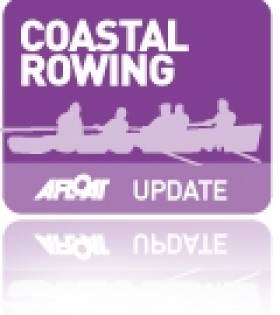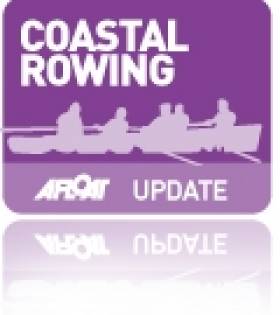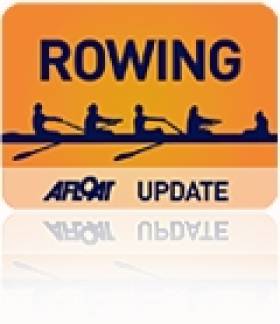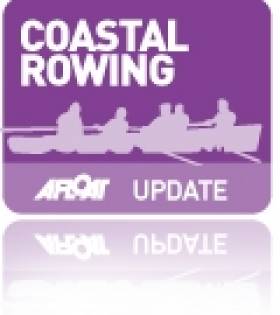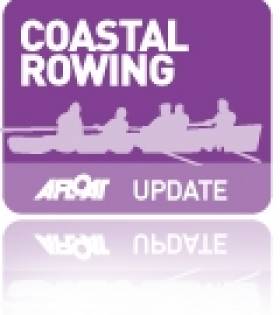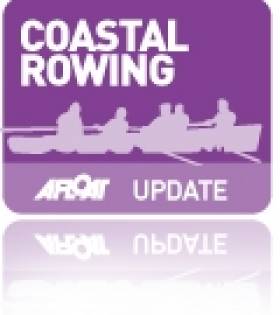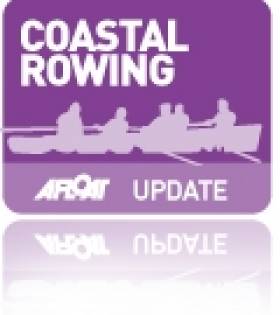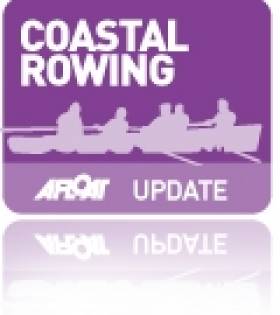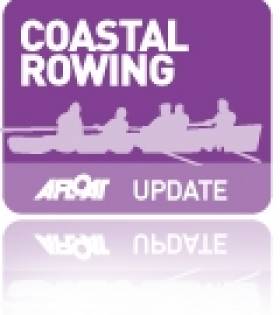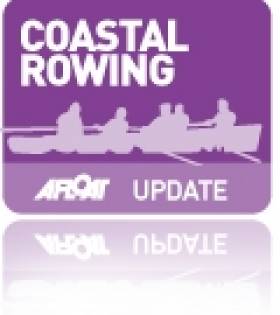Displaying items by tag: Coastal Rowing
Coastal Rowing Championships Comes to Dun Laoghaire
#coastalrowing – St. Michael's rowing club, Dun Laoghaire, will host round six of the East Coast, Coastal Rowing Championships on Sunday 27th July, 2014. The regatta will take place from the West Pier to the North of Seapoint Tower. With more than 80 teams competing from all over the East Coast, this will be an action packed day.
There will be 14 races of all age groups with the first race beginning at 10.30am. This year's event will see hundreds of men, women and children compete over a gruelling circuit in a bid to be crowned 2014 champions in their respective field.
Viewing is best from the beach at Salthill DART station and will be an excellent opportunity to view, support and enjoy this traditional form of coastal rowing.
Rowers Set Out To Follow 'Camino' Route By Currach
#Rowing - The Irish Independent reports on four intrepid coastal rowers who plan to follow the famous Camino pilgrimage route in a traditional currach.
Danny Sheehy, Liam Holden, Breandan O Beaglaoich and Breandan O Muircheartaigh set out from St James' Gate on the Naomh Gobnait this week, rowing out of the Liffey through Dublin Bay and down the east coast towars the Celtic Sea.
From there the four men aim for the south of England, onwards to France and around the Bay of Biscay, parallel to the renowned pilgrims' path leading to Santiago de Compostela in north-west Spain.
But such a gruelling challenge can't be completed in one go, and the wise quartet will take on the route in sections over three years - planning to complete their first stage, to Brittany, by 30 June.
Even then it will require a Herculean effort with non-stop 15-hour days in the currach, and typically unpredictable conditions at sea.
Independent.ie has more on the story HERE.
Rowers Needed for Boyne Boat Race
#ROWING: As part of the Irish Maritime Festival in Drogheda, coastal rowing club Inver Colpa are hosting a 14 kilometre rowing race from Clogherhead to Drogheda. The Boyne Boat Race is open to all rowing clubs in the country. The Irish Maritime Festival 2014 is being held in Drogheda from Friday 13th to Sunday 15th June.
#celticchallenge – During the May bank holiday weekend (2nd-5th May), 12 men and women from of St Michael's Rowing Club, Dun Laoghaire and volunteers from Irish Charity GOAL participated in the biennial rowing race across the Irish Sea known as 'the Celtic Challenge'. What started as a relatively calm sea turned into a tough crossing for the 12 brave men and women and they had to dig deep into their reserves to get over the finishing line, crossing the 150km course in 25hrs, 9 mins, 1 second. The relay race is billed as the longest 'true' rowing race in the world and is listed as such in the Guinness Book of Records.
Due to a good weather system, all the signs had a race start for the Saturday morning. However, the weather deteriorated and the race was given the thumbs up for 2 starts; 3pm and 5pm – on Friday 2nd May – much to the surprise of all participants. St. Michael's Rowing Club were the only crew to enter a traditional east coast skiff, a quarter ton wooden clinker style boat, whilst all other teams opted for the more modern fibreglass, Celtic Longboats. The Celtic Longboats would be much quicker especially in calmer conditions and were soon well on their way.
The format of the race is a relay. Each team has 3 crews of 4 rowers that rotate their time on the oar, resting and refuelling on an accompanying support boat. Generally 'one hour on, two hours off' is the rule of thumb, but conditions, strategies, injuries, and sickness may dictate otherwise. The first 14 hours were fairly calm and certainly much calmer than the conditions met in the previous Celtic Challenge in which more than half of the fleet retired. The choppy and somewhat tricky Arklow Bank was relatively calm too and this time we were past it in under, 2 hours.
As the sun set and darkness grew, the crew knuckled down to what would be seen as a fairly straight forward race across the Irish Sea. Their support yacht, the Emilija and the crew of the rib, the Wizard continued to work tirelessly to ensure the safety of the teams during the changeovers. Both crewed by quite remarkable and extreme professionals, who gave freely of their time to the cause and to whom the club is eternally grateful.
However, as the night went on cloud replaced the clear starry night and visibility became really difficult. We knew the weather was about to take a turn for the worse. Winds rose to around 12 knots which would not usually be seen as a real threat, but the tides and chop made for difficult rowing conditions. Swells along with small, but frequent waves ended any hope for a sub 20 hour finish – a feat that we were well on course for.
Sickness and dehydration were clearly having an effect as 1 hour stints turned out shorter distances. As the daylight came, it was clear the race was going to be another long one. The conditions meant teams hadn't travelled the distance they expected and knew they had to dig deep and work very closely as a unit to ensure spirits were kept high. The changeovers continued and the hours flew by, the crew could see land, and somewhere in the distance was Aberystwyth.
With the sight of the rolling Welsh hills upon the horizon, this gave everybody a massive lift. The rough sea had started to get calmer and this saw us lift average speeds from 2 to over 4 knots and we started to chalk off the nautical miles at an increasing pace. 2-3 miles off Aberystwyth and with the site of the Welsh seaside town in the distance, we were met by a pod of dolphins to welcome us to Wales. About 8-9 bottlenose dolphins started to leap out of the water and were playing games under the bow of the support boat. A fantastic sight that will never be forgotten!
The final changeover was made at around 5.30pm on Saturday, and the pier could be clearly seen with cheering voices being carried on the wind. Fireworks met the crew as they rowed over the finish line. On the slip after the finish, the organisers and other crews were clearly impressed with the 15-year old 'St. Michael' and her brave crew. At the awards ceremony the following day, St. Michael's retained the prestigious 'Spirit of the Celtic Challenge' trophy, which is given to the team which displays the greatest amount of endeavour when completing the course. This was a very proud moment for all the team as well as their friends, family, and all their club mates back home in Dun Laoghaire.
Second time Celtic Challenger and club captain, Nicola Fitzgerald said, "apart from me and 1 other, this crew had only been rowing for a little over 12 months. 5 of the crew representing GOAL had never rowed in an open skiff up until 12 weeks ago! What an achievement for a special bunch of people. They should be proud of themselves".
Camaraderie between the Welsh, Irish and English clubs and teams involved is huge and for the first time ever, the 21 entrants made it across the finishing line. Congratulations are also due to the other Irish teams who crossed the finish line with Wicklow Men's finishing second overall and the first Irish team to cross the line, Arklow Ladies taking the first Ladies Team prize, getting in under 20 hours, Foyle winning the first Mixed crew and strong performances from Ferrycarrig, and Dublin's Airport Fire & Police crews.
St. Michael's teamed up with Irish charity GOAL to participate in the Celtic Challenge to actively seek funds for a support project in the Philippines and a new skiff for St. Michael's Rowing Club.
Malahide Yacht Answers the Call to Support St. Michael's 'Celtic Challenge' Rowing Quest
#celticchallenge – Over the coming May bank holiday weekend (2th-5th May), 12 men and women from of St Michael's Rowing Club, Dun Laoghaire and volunteers from Irish Charity GOAL, will take part in a biennial rowing race across the Irish Sea known as 'the Celtic Challenge' writes Gareth Whittington. The race sets off from Arklow, Co. Wicklow with the finishing line in Aberystwyth, Wales. At 150km, this relay race is billed as the longest 'true' rowing race in the world and draws together 27 teams from Wales, Ireland and beyond. The team is taking on this challenge to raise funds for a support project in the Philippines and a new skiff for St. Michael's Rowing Club.
Towards the end of last week, our challenge ambitions hung in the balance. 2 support boats that came forward to help us out, both had to pull out due to technical problems. However, following a PR campaign through Afloat.ie and other media channels, fellow Celtic Challenger, Robert Finglas put us in touch with Noel Rouroc who sails his stunning 48' yacht, Emiliya, out of Malahide. The news was good. After a nail biting 24 hours and a serious lack of sleep, Noel confirmed that he would be able to help us out.
On behalf of St. Michael's Rowing Club, Dun Laoghaire and GOAL, I would like to take this opportunity to thank everybody for their help. Later this week we'll be posting a live tracking link on our Facebook page, this will enable you to see an update every 15 minutes, of our epic journey across the Irish Sea. Now the real hard work begins....
#coastalrowing – Coastal Rowing is an extremely exciting and rewarding sport and on Saturday 26th April between 10am & 2pm, St. Michael's Rowing Club, Dun Laoghaire will be holding open rowing sessions for U12s, U14s, U16s, U18s Boys & Girls.
The event is FREE and the format of the taster session will be on a drop in basis and will commence 10am sharp at the Coal Harbour. There will be a warm welcome to all and a session packed with lots of fun. All equipment will be provided. It is advised that anybody wishing to tryout should wear normal sports type clothes and runners.
Registration forms etc will be to hand on the day and must be filled in prior to stepping into the boats.
For any more information about the youth section of the club, please contact:
Gareth Whittington, Youth Officer, St. Michael's Rowing Club
Phone: +353-86-0447241
E-mail: [email protected]
#celticchallenge – Over the May bank holiday weekend (2nd-5th May), St Michael's Rowing Club have teamed up with charity GOAL to send twp crews across the Irish Sea to participate in the biennial 'Celtic Challenge'. The race sets off from Arklow, Co. Wicklow with the finishing line in Aberystwyth, Wales. At 150km, this relay race is billed as the longest 'true' rowing race in the world. Both teams are taking on this challenge to raise funds in aid of the people of the Philippines and a much needed skiff for St. Michael's Rowing Club, Dun Laoghaire.
We urgently need help in finding support boats and a support rib for the challenge. The support vessel must not be less than 10m in length and the powered RIB not less than 4m in length. If you have a yacht, licensed angling or dive boat, pleasure cruiser and would be willing to come along for what will be a memorable journey, please get in touch.
For an information pack on the event please contact; Gareth Whittington on 086 044 7241
Rowing Boys Have 700 Miles of Transatlantic Voyage Left to Go
#2boysinaboat – They have been rowing for 40 days – non stop. They have faced huge waves, 30 knot winds, constant soaking in sea and rainwater, no more than 80 minutes sleep at a stretch. They have lost over 12kg each in spite of eating 6000 calories a day, they have excruciating salt-sores on their bottoms and aching muscles all over but students Luke Birch and Jamie Sparks have rowed approximately 2300 nautical miles across the Atlantic, leaving just over 700 to go. Once completed, their two-person non-stop challenge to cross the Atlantic Ocean will see them become the youngest pair to row the Atlantic. They are raising money for Breast Cancer Care, having so far raising £160,000.
Childhood friends Luke Birch from Lincolnshire (Doddington; also an Edinburgh student) and Jamie Sparks from London (Islington; also a Bristol student) are attempting to break the World Record for the youngest team to row the Atlantic. At the same time, they are raising funds for Breast Cancer Care.
They have battled huge waves and swells, course-deviating fierce winds, narrowly missed being hit by a container ship, losing equipment overboard including their mattress, discovering 150kg of sea water in their bilges, going overboard on a rope to clean the barnacles off the hull, being thrown around a tiny cabin whilst trying to sleep and having to eat dehydrated food every day. Four teams have already been rescued from the race, and several others have severe problems with steering and power generation, but the 2 Boys in a Boat still press on and are at the front of the 'pairs' race . Morale peaks and troughs like the waves that batter them.
For more information visit www.2boysinaboat.com
#AllIrelandCoastal: East Ferry of Cork have been named Club of the Championships for the All-Ireland Coastal Rowing Championships. The event was held this year at Carnlough in Co Antrim, and next year’s venue will be in County Kerry.
All-Ireland Coastal Rowing Championships:
Club of the Championships: East Ferry RC, Cork.
Best Adult Crew: Cairndhu Senior Ladies.
Best Underage Crew: Portmagee, Kerry (under-12 girls).
Outstanding Rower: Lisa Cronin, Kilmacabea, Cork.
Awards for Services to Coastal Rowing: John Flynn, Wicklow RC and (ICRF): John O’Leary, Kinsale and Dock RC.
Special Award (from host club Carnlough): Bill Deasy, Myross, and Irish Coastal Rowing Rowing Federation.
Coastal Rowing Gets a Super Sunday for Dun Laoghaire Regatta
#coastalrowing – Last Sunday saw the 8th and penultimate leg of the 2013 East Coast Rowing series. It was a fantastic day in Dun Laoghaire, and the heavy downpours, which at one stage saw 8mm of rain fall within 30 minutes, was not going to dampen the spirits of the spectators and the travelling clubs from up and down the East Coast.
There were 80 teams from 9 participating clubs, competing across the 12 categories on the day. This we believe is a possible record for our sport. What can be claimed as a record is the number of St. Michael's crews that were entered; 14 in all with crews from U16s to Senior Mens & Ladies.
There were plenty of activities going on within Dun Laoghaire on Sunday, including the Rainbow Run and a swimming event from Seapoint, which added to the excitement on the day. Excellent organisation by all parties ensured a smooth running of all events.
St. Michael's had an excellent day with the 2 main success stories being the Senior Ladies crew of Eloise O'Riordan, Suzy O'Keefe, Orla Stavely, Dee Friel, (Coxed by James Byrne) coming home with yet another Gold, making them the East Coast champions with 1 race to spare.
The second success story of the day was the performance of the Inter Men's crew of Colm Crilly, Ger Ryan, Dave Cullen, Alan Quigley (Coxed by Rob Moloney), who brought home the first home Gold for a St. Michael's men's team for decades.
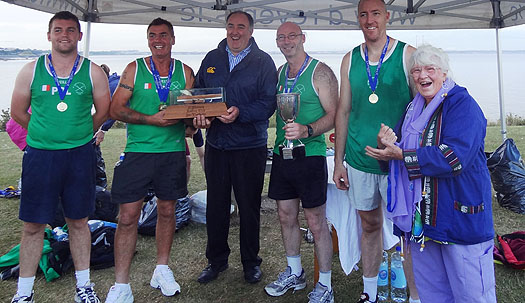
St. Pats Win Senior Trophy with Sponsor Arthur McKenna & Councillor Jane Dillon-Byrne
There were other super performances from the Junior Ladies crew taking silver behind a very strong Stella crew, a hard fought bronze for one of our Novice crews and strong performances from our 3 junior crews; U16 mixed, U18 Girls, U18 Boys.
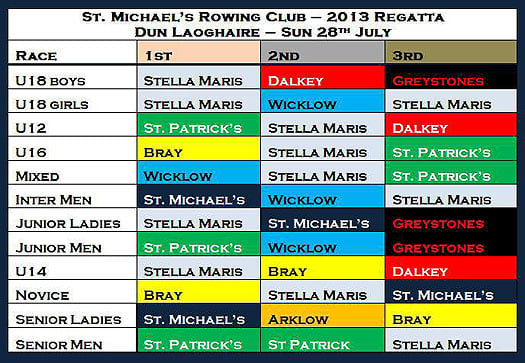
The results from last weekend have pushed us up into 4th on the overall team standings, which is way above our expectations.
The final regatta will take place this bank holiday Monday in Wicklow. The season finale starts with a parade through the town with racing due to start from 2pm.


























